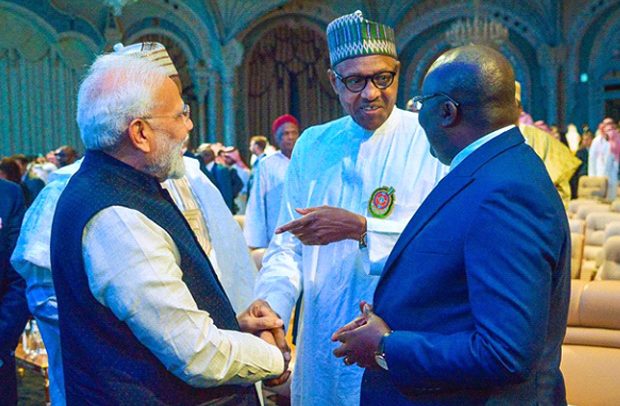Vice President Dr Mahamudu Bawumia, President Muhamadu Buhari of Nigeria and Indian PM Narendra Damodardas Modi in a chat.
GHANA AND India are on the same wavelengths when it comes to applying digital technology for moving their individual countries forward.
The leadership of the two countries have in the past few years embarked on major development projects all of which are digital tech driven.
This came to light when both the Indian Prime Minister Narendra Damodardas Modi and Vice Mahamudu Bawumia both took their turns to address the ongoing Future Investment Initiative (FII) summit in Riyadh, Saudi Arabia on Tuesday.
Prime Minister Modi asked countries to embrace what he called the Fourth Industrial Revolution which as he put it as the surest bet to leapfrog the ever changing global dynamics of development.
He said his administration has issued national identification cards to all Indians, introduced the use of mobile phone as a payments platform, and also digital address systems.
Of course these are areas Ghana has embarked upon in the past couple of years the results of which are overwhelming.
Dr. Mahamudu Bawumia also told the summit about how Ghana had taken to digital technology as the new dawn for economic development.
In a brief interview with the media, Dr. Bawumia indicated that much of the things India was doing in the digital technology space aligned with what Ghana had been up to since 2017.
“In Ghana, we have embarked on a progressive drive to issue national identification cards to all citizens. The process has started and expected to complete next year. We have also successfully implemented a digital property addressing system that provides physical digital addresses for every 5 by 5 square meter”, Vice President Bawumia indicated.
Dr. Bawumia believes that the combined effects of the national identity cards and digital addresses would ultimately be the solution to the problems of identification and traceability of persons and property in Ghana.
According to him, such interventions were needed to also de-risk the financial sector and help in the economic formalization efforts of government.
Touching on the financial sector and the need for technological innovation, Dr. Bawumia expressed satisfaction with Ghana’s mobile money payments interoperability system which by far recorded over a million transactions in September 2019 compared to the about 150,000 transactions a month at the end of 2016.
The Future Investment Initiative is an international platform for expert-led debate between global leaders, investors and innovators with the power to shape the future of global investment.

